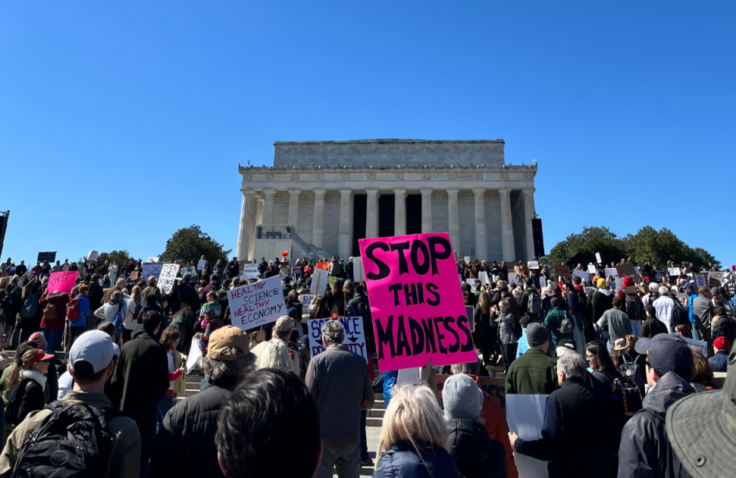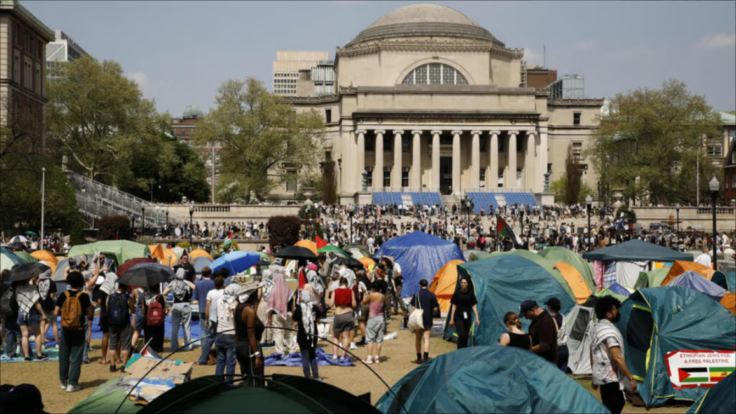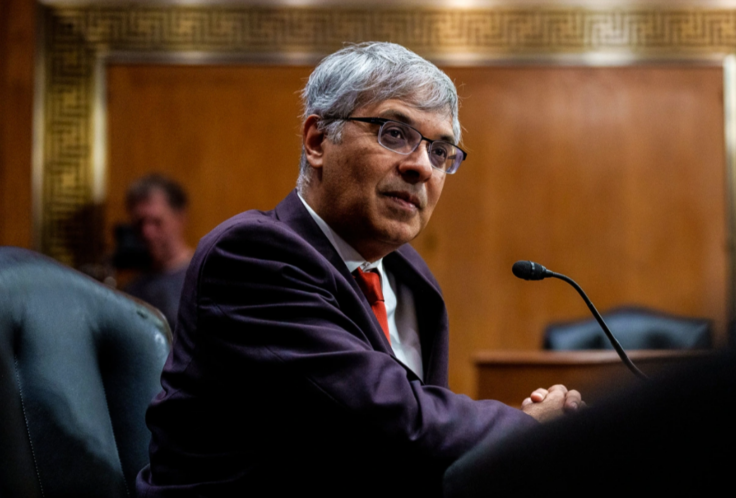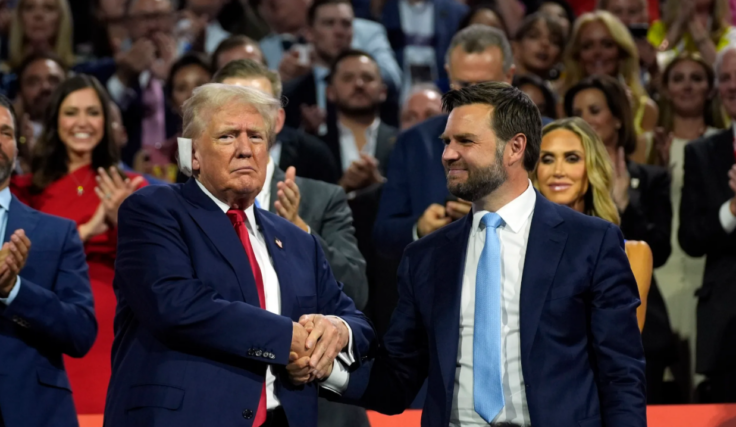
American universities are being stripped of government funding. Some universities have announced hiring freezes this year. Others are laying off their staff. Still others – Columbia University, for example – have been left without government grants. But beyond purely financial decisions, we are also seeing interference in the substantive work of science. Why is the Trump administration turning on scientists? T-invariant talked to Tufts University endowment professor, biologist Sergei Mirkin, who has been working in the United States for 36 years.
Sergei Mirkin was born in 1956 in Moscow. He graduated from the Faculty of Biology of Moscow State University in 1978, then entered graduate school at the Institute of Molecular Genetics of the Russian Academy of Sciences, defended his PhD thesis in 1983 and worked there until he left for the U.S. in 1989. From 1990 to 2006 he was faculty in the Department of Biochemistry and Molecular Genetics at the University of Illinois at Chicago (Professor from 2002). Since 2007, he has served as Professor and White Family Chair in Biology at Tufts University (Biology Department Chair 2013-2019). Mirkin’s research interests lie in the area of DNA structure and function: the role of genomic instability caused by repetitive DNA sequences and collisions between transcription and replication in human genetic diseases. He is a recipient of several prestigious scientific awards and honors.
The main enemy is university liberals
T-invariant: We recently published an interview with a researcher at the NIH (National Institutes of Health). Our interviewee agreed to speak only on the condition of anonymity, citing an executive order banning communication with the press. Several American professors responded to his interview. They wanted to share their pain, their bitterness, and their outrage. But when we offered to take it into the public space, they refused to talk about it: they said they didn’t feel safe. Why did you agree to speak openly?
Sergei Mirkin: I’m not surprised that they declined. Federal employees are indeed not allowed to give such interviews. Moreover, I heard from my acquaintances working at the National Institutes of Health, that scientists can now be fired even for insubordination. This is, of course, unheard of, but it is happening now. As for the university scientists, there is no such fear. I can tell you that in Boston and in other cities, academics are not silent, they are going public. There have been numerous “Stand Up for Science” protests. Perhaps when it comes to Russian-speaking scientists, the genetic memory of Stalin’s repression and the Gulag kicks in, and they are afraid of speaking publicly.

T-i: Reforms in science usually have two components: one is economic, the other is political or ideological. Let’s start with the first one. What is the essence of the economic reform of the scientific system that several current players in the Trump administration are now trying to accomplish at once?
SM: I think that what’s going on makes no sense from an economic point of view. It’s all being presented under the guise of reducing the federal deficit. Yearly, the federal government receives roughly $5 trillion in revenue, but it spends $8trillion. In other words, the yearly federal deficit is about $3 trillion. This has been going on for a while and as a result, our country accumulated a national debt that currently stands at $37 trillion. To understand the magnitude of this number: the GDP of the US is $27 trillion. Of the $8 trillion spent yearly, $6 trillion cover social security, medicare and medicaid, and only $2trillion is left for everything else. Of this $2 trillion, almost $900 billion goes to the military. It leaves just over one trillion for other agencies, including the NIH, NSF, Department of Energy, and others.
The NIH budget is $47 billion. The extramural budget is about $35-36 billion, of which roughly $10 billion go to the indirect costs, which are now proposed to be cut. Note, however, that even if they are cut in half, the entire savings would amount to $5 billion. These are pennies on the scale of the national deficit.
T-i: But it’s a huge amount of money for university budgets.
SM: That’s the whole point. It’s a significant amount of money for the universities. For the whole governmental budget, it’s negligible.
T-i: But still, it’s very strange: closing the national budget deficit at the expense of the universities. It sounds like an unpopular decision, which is not very effective economically. So is it really about something else?
SM: Yes, of course it is. Katie Miller from the new Department of Government Efficiency, headed by Elon Musk, wrote about these indirect costs: “President Trump is doing away with Liberal DEI Deans’ slush fund.” And J.D. Vance explicitly said that universities are enemies that should be punished. So we shall only discuss the political component of this phenomenon: economically it doesn’t make any sense.
T-i: It’s generally believed that a large part of the money going to basic science in the US is charity, endowment, and tuition paid by parents for their students. But then universities lose their government funding and collapse ensues. Why?
SM: Historically prior to World War II, scientific research in American Universities was funded by private charitable organisations such as the Rockefeller Foundation and others. During World War II, university scientists were needed to help the state, particularly in physics, biomedicine, antibiotic production, etc. The science advisor to the US President at that time was Vannevar Bush, an engineer, scientist and politician, and coincidentally a graduate of Tufts University. He proposed a grant system – giving federal money to universities to boost research for defense purposes. Universities were initially unhappy with this idea. They feared that it could lead to governmental interference in their internal affairs (which is exactly what we are seeing now). Bush then proposed to give the universities extra money to allow their scientists to do federally contracted research. And that’s what all the fuss is about now – these so-called indirect costs.

After the war, Bush actively advocated to continue this grant program, now for peaceful purposes. The first NIH grant was given in 1946 to the University of Utah to study the inheritance of muscular dystrophy. And indirect costs were first 8%, then 15%, and then 20%. Now they average 38% nationally. The rate actually varies from university to university: at my university it’s 56%. Part of this money goes to the maintenance of the premises, heating and cooling of laboratory buildings, maintaining basic facilities, etc. The other part supports scientists who write grants. When I write a grant, I only deal with its scientific component. The budget and everything else is handled by the University grant office. I just outline the basic parameters for them. Admittedly, the details of indirect costs spending by universities are not openly disclosed. Today, this lack of transparency is one of the grounds for attacking universities.
T-i: What’s surprising is that many people who voted for Trump, on a facile level, support these actions. They say, “It’s the right thing to do, we don’t want our tax dollars going to these professors.” What’s behind this?
SM: To a very large extent, this all comes from the movement called National conservatism. This movement has many supporters, and its main think tank is the Heritage Foundation. It was started in 1973 by Republicans who were dissatisfied with Nixon’s policies. It seemed to them that Nixon was too left-wing: he went to China, etc. So they started developing a program of national conservatism. They were people from academia: philosophers, political scientists, economists, – “boring” people. So they realized from the very beginning that they needed a bright spokesman. Ronald Reagan, a former actor and a man of considerable charisma, became their face.

The cornerstone of national conservatism is a concept that the American nation is the blessed nation. And since this blessing was given a long time ago, there is no need to change its societal values and rules. What are they? The country is run by white males. We have the 47th president in the office now, all men, only one of them was not white – Barack Obama. Then there’s the traditional family. And then there’s the traditional religion, which is Protestantism. Again – of all the presidents in the country, only two have been Catholic: John F. Kennedy and Joe Biden.
And who are the main enemies of this concept? The first enemy is demography: It is expected that by 2045, whites in the United States will no longer be in the majority. Already now, whites are not the majority among people under 20. What to do about it is unclear. And hence the proposed ban on immigration from Latin America, because the Latino population is the fastest growing in America. Naturally, this is presented to the public under the guise that these immigrants are rapists, murderers, they eat dogs and cats, etc. Continuing attempts to ban abortion and restrict contraceptives are also aimed to solve this demographic problem with a hope that white women will start having many children again. It is impossible to imagine, however, a modern white woman in America being “barefoot, pregnant and in the kitchen”, as national conservatives dream. And by the way, that’s why women overall voted against the current administration.
But the biggest enemy of national conservatives is liberals. And where are most of them hiding? First, in governmental agencies. With each administration, heads of the departments change, but the bureaucrats remain. These are well-educated people with mostly liberal views. Thus, they must be dispersed. That’s why we’re seeing a massive attack on various federal departments. And secondly, liberals populate American universities. They teach that all people are equal, that we should treat people with other views, including that on gender and sexual orientation, with respect, and so on, which goes contrary to the traditional concept of a blessed nation.
T-i: It turns out that American universities are on the cutting edge of the ideological confrontation between the two Americas?
SM: Exactly. And I would also like to add that the election of Barack Obama was an absolute shock to the national conservative movement. That’s largely why they stepped up, and by the way, that’s when Donald Trump went into politics. For centuries, white, prominent, rich men were running this country, and here we go: a black underdog comes out of nowhere to tell them what to do. Of note, to this day, when Trump mentions Obama, he always says, “Barack Hussein Obama”, implying that he is a Muslim (which of course he is not), thus playing to the lowest instincts of his supporters.
Will there be a brain drain?
T-t: Today’s crisis with universities has a long historical backstory. Nevertheless, American universities didn’t expect all of this to happen. We’ve seen JD Vance’s keynote address, which is called “Universities are the Enemy.” But it’s a 2021 speech. I mean as early as four years ago, he was making that perfectly clear. This attack was not sudden, it was in preparation.
SM: Yes, it’s a prepared action. There is Project 2025, which was developed over several years in the anticipation of republicans’ victory, where all this was clearly stated. Yet Trump is a man of incredible political instincts. He was repeatedly asked on the campaign trail about Project 2025. He always answered: “I had nothing to do with that.” In other words, he dodged the question even though many people from his former administration were involved in the development of this project. And what we are seeing now, is exactly what was proposed in Project 2025. People also remembered that during his first term he did not do anything nearly as radical as he does now. In retrospect, he wanted to do it, but these liberals in the federal government (nowadays called the deep state) didn’t let him. For example, he tried to cut the NIH budget but somehow ended up with an increase in the NIH budget. Admittedly, Republicans learned from their past failures and ran a flawless election campaign. Democrats, on the other hand, made many mistakes.
T-i: Columbia University, one of America’s top universities, has become a flagship of academic anti-Semitism. Jewish students don’t feel safe there, the university administration can’t ensure the educational process, there is constant interference by pro-Palestinian activists in academic classes,and against this backdrop, President Trump announces that he is withdrawing money from Columbia University. Not the money that will come, not the grants that will come, but the money that is already there. What could this unprecedented decision mean?
SM: This is a very difficult and sensitive issue. There is indeed a 1964 law stating that organizations that receive federal money cannot discriminate against people on the basis of their race, ethnicity, or other characteristics. Note that it was passed when the country was actually in a state of undeclared civil war. And this law has allowed under-represented minorities, primarily African-Americans, to study, find well-paid jobs and succeed in life. Combined with affirmative action, it effectively solved the problem. And it is a bit ironic that this law is now being used by Trump to take money away from Columbia University on the grounds that there is discrimination against Jews. But in reality, there was no discrimination against Jews: they were freely admitted to the university, they were commonly hired to various University jobs, they were not fired for being Jewish, etc. What was going on there were pro-Palestinian protests, where people said things that were extremely unpleasant and offensive to Jewish students.

T-i: But the commission that investigated the incident for manifestations of anti-Semitism found evidence of such manifestations.
SM: It’s a complicated story. Statistically, 52% of Americans have pro-Palestinian views. If you look at Americans under 30, this figure is closer to 70%. Consequently many young people in the universities share these pro-Palestinian views. Obviously, they want to express them and it’s their right protected by the First Amendment: we do have freedom of speech in this country. Where do we draw the line between free speech and hate speech? That’s a very difficult question. I’ve dealt with it directly, talking to students in the classroom. I tried to explain to them: if you chant “From the river to the sea Palestine will be free”, – it is a call for the destruction of the state of Israel, it is hate speech. While if you say that Israel conducts genocide of Palestinian people in Gaza, that’s free speech, not the hate speech.
T-i: But now Trump has promised that Columbia University will keep the money. What steps did the university have to take, what did they have to promise?
SM: This is the clearest example of governmental interference in the University affairs. If Columbia had been operating the way it was operating before World War II, no money could have been taken away from it and, therefore, it would not have had to appease the federal government in any way, shape or form. As it stands now, however, they were required to change many things. They promised that rallies will not be held near administrative and academic buildings so that people could walk to work or classrooms in peace. Participants of the rallies will not wear masks covering their faces so that they can be identified later.
But one of the extremely uncomfortable measures is that the Department of Middle Eastern, South Asian, and African Studies in Columbia will go under academic receivership. This is unprecedented in terms of academic freedom. I’m a university professor, and I would not agree if someone tells me what to teach and what not to teach. It is my divine right to teach the way I feel right. The same should apply to the professors of Middle Eastern studies.
And this intervention shows precisely that the universities’ initial concerns were fully justified. What happens next with Columbia University? They say, “We’ll probably return your money back. But you still need to do this, and then that, and so on.” Because when it comes to freedom it’s always like this: if you give someone an inch, they’ll take a mile. I don’t think Columbia University made the right decision to appease the government. They should have gone to the courts, and maybe they would have won. But they decided not to take the risk. Here’s a good example of the contrary: the governor of Maine. She was at a meeting in the White House, when Donald Trump told her: “If you don’t block transgender athletes from competing in your sporting events, I am going to take all the federal money away from your state” To that, the governor calmly responded: “I’ll see you in court.” And this is the right answer – because such crude interference must be resisted. If it is not resisted, we’ll end up having a dictatorship. And dictatorship is what I personally and many of my friends ran away from in the first place.

T-i: The NIH was the first to be affected by the reform. Not too long ago, the Senate held a hearing to nominate a new director. And Jai Bhattacharya, speaking during the hearing, laid out his five priorities for the institute system. First and foremost they are research of chronic disease, reproducibility of research, encouraging a culture of scientific dissent, funding cutting-edge research, and restricting risky research that could cause a pandemic. How do his policy actions sound, given that this is a Kennedy appointee recommended by Trump?
SM: They sound fine. The question is, however, what is he going to do, what is the task before him? It’s one thing what a person says in the Senate trying to be confirmed. It’s another thing what he will actually do afterward. In all likelihood, he will be given directions by Robert Kennedy, Jr. because the NIH is part of the Department of Health and Human Services. And Robert Kennedy Jr. is a well-known anti-vaxxer. We will wait and see what transpires…
T-i: And how is the U.S. academic community in general reacting to what’s going on? From afar, it seems that everyone is waiting for the congressional elections in a year and a half, hoping that it will be democratic, and then it will be possible to somehow oppose Trump’s reforms. After all, this is America with its traditions of democracy and freedom of speech.
SM: I’ve already mentioned the Stand Up for Science rallies. In Boston, hundreds of scientists came to this rally. There were also a lot of people rallying in Washington, New York, San Francisco, and in many other cities. Scientists are protesting vigorously, all social media outlets are full of protesting posts, journals like Nature or Science are publishing many articles on this topic. And, yes, Congress will likely become Democratic after the midterm elections in 2026.
T-i: The Dutch education minister is going to set up a fund to provide stakes for US expatriate scientists. Similar news is coming from other countries. Do you think a brain drain will follow?
SM: I think there will be some brain drain. By the way, I can tell you a surprising personal story. In the midst of all these events, I was invited to apply for a mega-grant in Russia. Can you imagine how promptly the Russian Science Foundation reacts? In general, American scientists who feel uncomfortable in the current political climate are encouraged to apply for these mega-grants. In other words, Russian scientific administrators are quick to take advantage of the situation in the US. I, understandably, declined.
I know many scientists who are now looking for positions in Europe. Especially since Europe has opened its arms widely for the US scientists. I am certain that the Chinese government is trying hard to bring back their scientists from the United States. But for them, it is like going out of the frying pan into the fire: the overall situation there is much worse than in our country. India, of course, would also like to bring back its scientists. So, yes, there will be some brain drain. But I remain optimistic: I don’t think that the current assault on science will last long. I know that some professors started to advise young scientists to leave America. I am not there yet. We have to get through a year and a half (until the midterm elections), and then, I hope, it will be better.
Scientism is dissenting opinion

T-i: Do the universities themselves, the academic establishment feel responsible for what is happening? In Vance’s speech about universities being the enemy, he gives a long, coherent explanation of how universities today are contrary to the interests of American society. In particular, he makes the following point: universities have indoctrinated the idea that without a college education, a decent life as an American is impossible. That only a good diploma will provide you with a decent life, and otherwise there is no other way. In Russia, some politicians and deputies also periodically say that liberals sit in Russian universities, that they are breeding grounds for everything foreign and unscrupulous. But at the same time, parents do everything possible for their child to enter and graduate from the institute. Because social elevators are, first of all, higher education. And no matter how many people convince us that universities are the enemy, Russian parents know that this is not true. Does it work differently in America? Why do Vance’s words resonate with so many citizens?
SM: I don’t think that JD Vance’s ideas are at all practical. It is hard to live in the modern world without university education. You simply won’t understand what’s going on around you. Forget about politics, how could one understand what’s going on in medicine, in biology, in physics, engineering, in economics? And in fact, both Trump, and JD Vance, as well as everyone around them graduated from good universities – they all are well-educated people. They know, however, from their own experience that educated people are hard to control. Universities teach students the independence of thought.
I always tell my students: scientific thinking is a dissent by default. If you think like everyone else, you will do nothing in science. And that’s what universities teach, that’s our sacred mission. And that’s why it’s difficult for the government to control university graduates: they often disagree with the state policies, they have their own opinions, and they express them in a powerful way. Uneducated people are much easier to govern. We know this well from the example of my home country Russia and many other countries. Make no mistake, all these statements about enemy universities are just tactics.
The question is what they want to achieve? I suspect that in fact, they just want to keep their power. And this is humanly understandable: who doesn’t? But it turns out that the dynamics of society works against them. That’s why there is such an escalation now. In the end, they will lose this battle. But in the interim, they can make a hash of American democracy.
T-i: This is an attempt to keep in power the part of human thinking that is dying out. This is exactly what political scientists point to as the reason why Vladimir Putin started the war. He needed to grab hold of his past and do something absolutely irreversible, something that cannot be undone. Do you think that’s where there is such mutual sympathy between him and Trump?
SM: I think so, yes. Republicans in the Congress were fervently supportive of Ukraine before Trump took office. They routinely called Putin a thug, a murderer, and so on – just like Democrats did. Now they’ve adjusted their rhetoric. I also cannot help but notice that tactically, Trump and Republicans learned a lot from Putin. In particular, this concept that educated people are the enemies, that the liberals are the enemies – that came from Putin. And of course from earlier dictators: this was at the core of Mao Zedong’s cultural revolution.
T-i: Having found themselves in such an unfamiliar situation, will American scientists understand their Russian colleagues better? Are there any consonances, parallels? Will it become clearer what is happening to scientists in Russia?
SM: That’s a good question to which I don’t know the answer. Many Americans – and not just scientists – look at what’s happening now and cannot believe their eyes. They say: this can’t be happening, this can’t go on much longer. Everybody knows about dictatorships, Hitler, Mao Zedong, Stalin, Putin. But people don’t believe this can happen in the United States. And I don’t believe it either. Many federal employees who voted for Trump are now cursing themselves: “What have we done?” And Muslims who voted for him are now saying, “He’s going to have our Palestinian brothers deported.” And many other similar examples. People are quickly realizing that this election was a big mistake. I hope it won’t last long, it’s just a short-term setback.
T-i: Let’s see if America is immune.